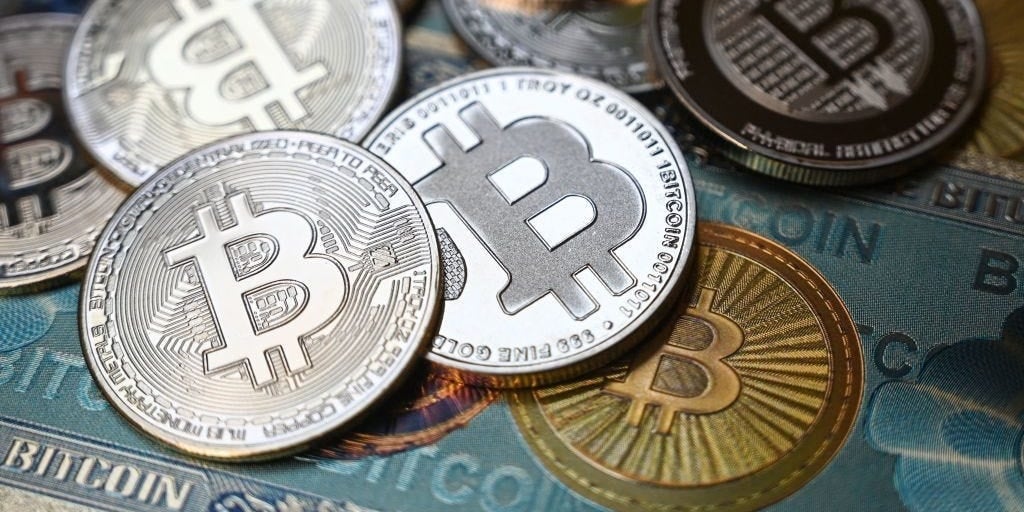- Bitcoin was once touted as a replacement for fiat currencies.
- It did not replace them, but it and other crypto currencies have since proven themselves as a store of wealth.
- In less than a decade, crypto currencies have moved from curiosity to a $3 trillion market.
- For more stories go to www.BusinessInsider.co.za.
About 10-years ago, I’m at a party making small talk with a guy who was telling me how crypto currencies are going to take over the world.
He was trying to convince me that this new thing called Bitcoin would take off, and that it would one day become a real competitor to good old rands and cents.
I scoffed at his views.
I told him he did not understand what he was talking about. To me, Bitcoin sounded like a solution in search of a problem.
I also pointed out that central banks would never allow some unregulated computer code to be used as payment. I reminded him that those who oversaw currencies tended not to want to give up their monopolistic control over them.
To prove my point, I asked him had he bought anything with this so-called currency that was “mined” in his computer.
Out of frustration he told me he did make a purchase. He used a Bitcoin to buy a plastic mold of the Bitcoin symbol.
I vaguely remember asking him: “So you bought a Bitcoin? With your Bitcoin?”
With that reply, for a long time, I thought I had won that debate. Time, however, has since proven my smarmy self-satisfaction to be very wrong.
Bitcoin, and the other crypto currencies like Ethereum and Dogecoin along with the underlying blockchain have emerged as the most influential technologies over the past 20 years.
In less than a decade, crypto currencies have moved from geekish curiosity to a $3 trillion market.
Why was I wrong?
Given the staggering growth of the crypto market, over the years, my hindsight has increasingly haunted me.
Every now and then, I look back and wonder what did I not get about Bitcoin? Where was the fault in my assumptions that led me to believe that there was no real future in crypto?
At the time, my beliefs seemed sound. Crypto currencies were not a reliable unit of accounting, it was a tricky store of value and not widely used as a means of payment.
Put another way would you accept payment in a currency that for a long time had no real value; few people were willing to accept as payment; and would create confusion when it came to recording it in an income statement and balance sheet?
These assumptions seem reasonable, but now I realised my mistake was to think of crypto currencies as an actual currency. I was looking at the likes of Bitcoin and comparing it to rands, pounds and dollars.
Wrong assumption
Instead of looking at them as currencies, I should have compared it to gold coins like Kruger Rands.
Though a Kruger Rand is made from metal, is a coin, and has the word rand in its name, it’s not an actual currency in that it’s not a measure of accounting and not widely used as a means of payment.
It is, however, used as a store of wealth, which is where crypto currencies have found their niche.
Though the value of Bitcoin has roller-coasted over the past decade it has overall made dramatic gains in value. A single Bitcoin traded at $1 in February 2011 and is now trading at $47,686.
Looked at this way, it has even outstripped the growth rate of Kruger Rands, which by comparison only trebled in value from R10,800 to about R30,000 over the same period.
The shift to using Bitcoins as a digital Kruger Rand was a steady one. As the brief attempts to use it as fiat currency were abandoned, it was increasingly just seen as a way to get wealthy – through mining them – and to store wealth.
In becoming a wealth creator and store of wealth, Bitcoin had solved the problem it was searching for.
Lesson learned
The lesson I’ve learned was just because I couldn’t imagine a use for something, it did not mean there was no use for it.
I did not foresee Bitcoin becoming a store of value. This meant I had a limited understanding of its potential.
The realisation on how I got it wrong meant I’m now fighting my sceptical instincts when it comes to the lasted derivative of the crypt currencies, non fungible tokens (NFTs).
My first reaction NFTs was to look at them and think, why on earth would someone buy a digital good that can’t be copied?
But then after some reflection, I thought why would people not take a rare digital good as seriously as they took a rare physical good? Are they not just the digital version of stamps?
Looked at this way, just because it’s something I’m not valuing, it did not mean it was something someone else was not valuing.
Overall, I think the biggest lesson I’ve learned is not to be married to my opinions. I have had to learn to be brave enough to acknowledge when my assumptions were wrong or incomplete, and not to fall into the trap of defending the ridiculous.
PS
And apologies to the guy I argued with at a party in a penthouse on 15 on Orange, in Cape Town 10 years ago, whose name I have long forgotten. You were wrong about Bitcoin replacing the rand but right about taking it seriously.
I hope your early foresight has made you fabulously wealthy.





